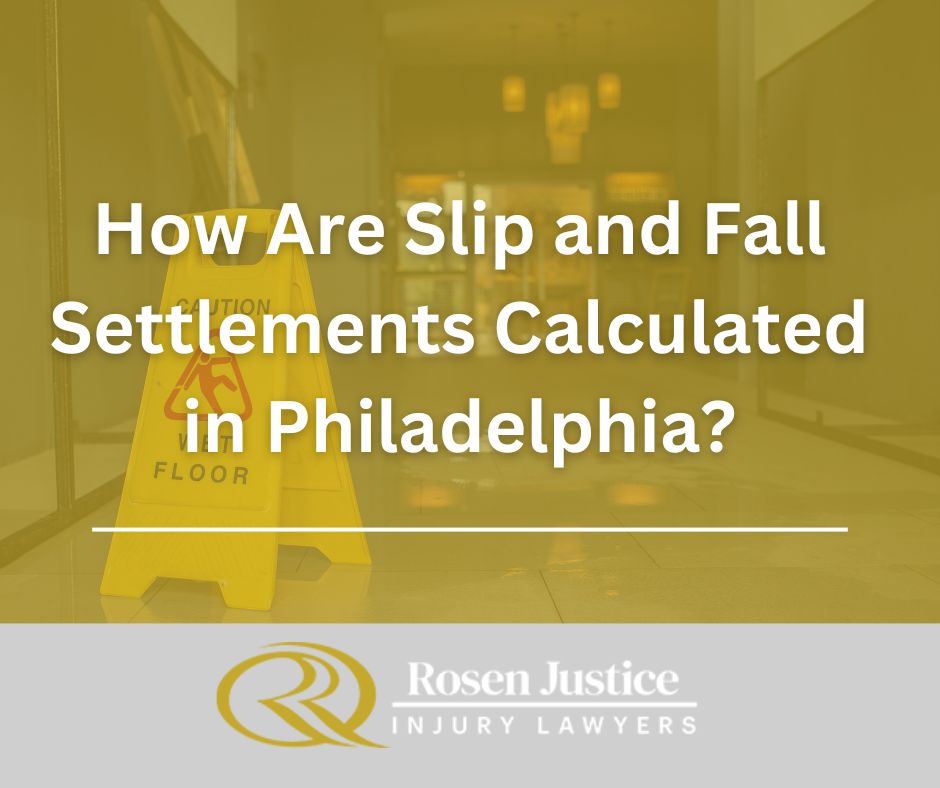How Are Slip and Fall Settlements Calculated in Philadelphia?

Have you recently experienced a slip and fall accident in Pennsylvania? You’re not alone. Slip and fall incidents can lead to severe injuries, leaving victims grappling with physical, emotional, and financial burdens. If you’re considering filing a claim, you might be wondering: how are slip and fall settlements calculated in Philadelphia? Understanding the process can provide clarity and help you navigate your legal options with confidence.
Premises Liability in Pennsylvania
In Pennsylvania, premises liability laws dictate the responsibility of property owners to maintain safe conditions for visitors. According to the law, property owners must ensure that their premises are free from hazards that could cause harm to others. This includes regular maintenance, repairs, and adequate warnings of any potential dangers.
The statute for premises liability in Pennsylvania can be found under Title 42, Chapter 83, Section 8332. This law holds property owners accountable for injuries that occur due to dangerous conditions on their premises, provided certain criteria are met.
How Are Slip and Fall Injuries Calculated?
Calculating slip and fall settlement amounts in Philadelphia, Pennsylvania, involves various factors that determine the value of a claim. Understanding how these settlements are calculated can provide insight into what to expect when pursuing compensation for injuries sustained in a slip and fall accident. There are no average slip and fall settlements becasue compensation is based on the unique facts of each case.
Extent of Injuries
One of the primary factors influencing the value of a slip and fall settlement is the extent of the injuries suffered by the victim. This includes the severity of physical injuries, the need for medical treatment, and the prognosis for recovery. Injuries that result in significant medical expenses, long-term disabilities, or chronic pain typically lead to higher settlement amounts.
Medical Expenses
The cost of medical treatment resulting from the slip and fall accident plays a significant role in determining the value of the settlement. This includes expenses such as hospital bills, doctor’s visits, prescription medications, physical therapy, and any necessary medical procedures or surgeries. Victims who require ongoing medical care may be entitled to compensation for future medical expenses as well.
Lost Wages and Income
If the slip and fall injuries prevent the victim from working or result in a loss of income, they may be entitled to compensation for lost wages. This includes both current and future lost earnings if the injuries impact the victim’s ability to work in the long term.
Pain and Suffering
Pain and suffering damages are non-economic damages intended to compensate the victim for physical pain, emotional distress, and loss of enjoyment of life resulting from the accident and injuries. Calculating pain and suffering damages is subjective and may vary depending on the severity of the injuries and their impact on the victim’s quality of life.
Property Damage
In some cases, a slip and fall accident may result in damage to the victim’s personal property, such as clothing, electronic devices, or eyeglasses. Compensation for property damage may be included in the settlement amount.
Comparative Negligence
Pennsylvania follows the doctrine of comparative negligence, which means that the compensation awarded to the victim may be reduced if they are found partially at fault for the accident. The degree of the victim’s negligence is assessed, and their compensation is adjusted accordingly.
Evidence of Liability
Proving liability is essential in slip and fall cases. Gathering evidence such as witness statements, surveillance footage, accident reports, and documentation of hazardous conditions at the scene can strengthen the victim’s case and support their claim for compensation.
Legal Representation
Working with an experienced slip and fall attorney can significantly impact the outcome of a settlement. Attorneys understand the legal nuances of premises liability law, can accurately assess the value of a claim, and negotiate with insurance companies on behalf of the victim to ensure they receive fair compensation.
Factors Influencing Slip and Fall Settlements
Several factors come into play when calculating slip and fall settlements in Philadelphia. The severity of the injury, the extent of medical treatment required, and the impact on the victim’s life are key considerations. Additionally, whether the victim undergoes surgery and the associated costs can significantly affect the value of the claim.
Slip and Fall Settlements with Surgery
If your slip and fall injury necessitates surgical intervention, your settlement amount may be higher to account for medical expenses, rehabilitation, and potential long-term effects of the procedure.
Slip and Fall Settlements without Surgery
Even if surgery isn’t required, slip and fall injuries can still lead to significant medical bills, lost wages, pain, and suffering. Settlement amounts in such cases depend on the extent of the injury and its impact on your life.
Proving the Value of Your Claim
To establish the value of your slip and fall claim, it’s essential to gather evidence of liability and document the extent of your injuries. This may include photographs of the accident scene, medical records, witness statements, and expert testimony from doctors and other professionals. Gaining access to this type of evidence is an important part of how slip and fall settlements are calculated.
An experienced personal injury attorney can help you navigate the legal process, negotiate with insurance companies, and advocate for fair compensation on your behalf.
Who Could be Liable for a Slip and Fall Accident?
In Pennsylvania, as in many other states, premises liability laws dictate who could be held responsible for a slip and fall accident. Understanding these laws is crucial when pursuing a claim for compensation. Generally, premises liability refers to the legal responsibility of property owners and occupiers to maintain safe conditions on their premises. When they fail to do so and someone is injured as a result, they may be held liable for the damages.
Determining liability in a slip and fall case often involves assessing whether the property owner or occupier acted reasonably in preventing the accident. Factors such as whether the hazardous condition was foreseeable, whether adequate warnings were provided, and whether the responsible party had knowledge of the dangerous condition are taken into account. Some potentially liable parties may include property owners, business operators, landlords and property managers, contractors and maintenance companies, and government entities.
Contact Rosen Justice Injury Lawyers
Understanding how slip and fall settlements are calculated in Philadelphia can empower you to make informed decisions about your legal rights and options. If you’ve been injured in a slip and fall accident, don’t navigate the complexities of the legal system alone.
At Rosen Justice Injury Lawyers, we understand the challenges you’re facing and are committed to helping you seek the justice and compensation you deserve. Contact us today for a free consultation to discuss your case and explore your legal options.

